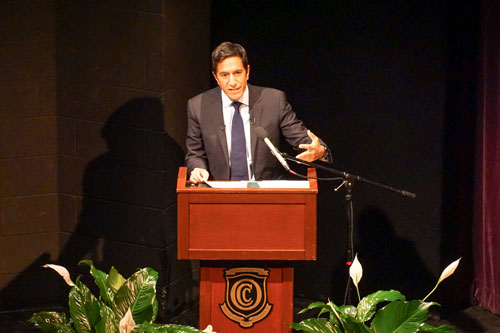TOMS RIVER, NJ – The 2022 Blauvelt Speaker Series kicked off in high gear at Ocean County College on February 2 with a visit from Dr. Sanjay Gupta, Emmy-award-winning journalist, neurosurgeon, and chief medical correspondent for CNN.
The highly-anticipated event began with an informal Q&A session with OCC nursing students, followed by a reception and book signing in the Novins Planetarium. Gupta’s presentation on the Grunin Center’s Main Stage capped off the evening, which was presented by the Ocean County College Foundation.
“The Blauvelt Speaker Series provides our students and community an opportunity to hear from thought leaders directly, ask questions and learn from diverse perspectives,” said Ken Malagiere, Executive Director of the Foundation. “We are so very thankful to the Wintrode Family Foundation and all of our sponsors for their support of this tremendous initiative at Ocean County College.”
A Matter of Trust
Excitement was palpable in the theater when Dr. Sanjay Gupta met with students enrolled in the nursing program at OCC. Before taking their questions, he thanked them for what they are doing and assured them that they are needed now more than ever.
“Nursing careers are critical roles to fill,” he said, adding that while the trusted sectors of society may have shifted over the past several decades, nursing remains crucial to public confidence.
Gupta sat on the edge of the stage and invited the students to ask questions. Topics ranged from nutrition to mental health to preparing for the unique challenges of healthcare training. Students also conveyed concerns about misinformation and its impact on healthcare decisions, and asked how healthcare providers can try to combat its spread, especially during a public health crisis such as the COVID-19 pandemic.


Gupta offered several suggestions. “Keep up with the science,” he said. “Be transparent about the fact that things can change.” In conversations with patients, he added, it is up to healthcare professionals to provide the best evidence-based information available, and explain that decisions are made “based on what we know now.” He also emphasized the importance of earning and nurturing patient trust.
As the session ended, Gupta said that a career in healthcare is challenging and will require sacrifice, but assured the students it was worth it. “The gratification from being able to care for people is unbelievable,” he said. “This is the greatest profession of them all.”
Chasing Life and Cheating Death
At what age does “old age” actually begin? The answer, according to Dr. Sanjay Gupta, may depend on who you ask – and where they live.
Living better and longer was the topic of Gupta’s keynote presentation, which was also presented to a virtual audience. Until recently, scientists believed that the brain has a fixed number of neurons—brain cells—that grow old and deteriorate over time. Conventional wisdom held that a gradual decline in cognitive ability was inevitable as we grow old.
We know now that is not the case. Over the past decade or so, researchers have discovered that the brain can continue to grow and change throughout our lives. As the brain gets older, it can get better – learning to function more effectively over time. “More so than any other organ,” Gupta said, “the brain is magical in this regard.”
So how can we use that knowledge to live longer and more meaningfully? In many cultures, people are already doing it – even though they may not know it. In recent years, Gupta has traveled around the globe to visit the happiest, healthiest cultures, to see how they live and uncover their secrets for longer, more fulfilling lives.
What he’s learned, he told the audience, is that “being old is not that bad – especially in certain parts of the world.”
The key can be found in the concepts of cognitive reserve and resilience. Both of these relate to the brain’s ability to protect itself against deterioration, and both are impacted by the way we live.
“We use small portions of our brains really well,” Gupta said, “but we are barely exploring the rest of it.” If we think of the brain as a planet, most of the population is currently centered in certain areas. We need to build cities in other places, too.
“Do brand new things, or do things in brand new ways,” he advised. “Do something that scares you once in a while. Get out of your comfort zone.” By making your brain do new things, you can help build that reserve and develop resilience that helps the brain adapt and grow.
So how old is “old age”?
While there may be no single definitive answer, Gupta said, one thing is certain: “The older people become, the more likely they are to see old age as something that happens later in life.”
The Blauvelt Speaker Series is funded in part by the generosity of the late Bradford Thomas & Eleanor G. Blauvelt and The Wintrode Family Foundation. This year’s 2022 additional sponsors include Arlene and Frank Dupignac, Jr., the late Helen M. Earles, Ph.D., Judi and Stephan Leone, New Jersey Natural Gas, and Novins, York, Jacobus and Dooley. For more information about upcoming presentations, visit go.ocean.edu/FoundationEvents.
Media Contact
Dori Londres
Marketing & Communications Writer/Editor
dlondres@ocean.edu
732 255 0400 x2308




